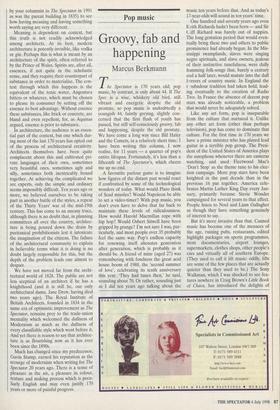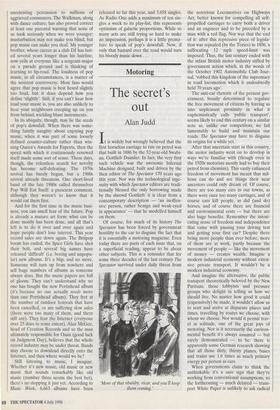Pop music
roovy, fab and happening
Marcus Berkmann
The Spectator is 170 years old; pop music, by contrast, is only about 44. If The Spec is a wise, whiskery old bird, still vibrant and energetic despite the old prostate, so pop music is undoubtedly a youngish 44, faintly greying, slightly con- cerned that the first flush of youth has passed, but still self-consciously groovy, fab and happening, despite the old prostate. We have come a long way since Bill Haley and the Comets, in a relatively short time. I have been writing this column, I now realise, for 11 years — a quarter of pop's entire lifespan. Fortunately, it's less than a fifteenth of The Spectator's, which cheers me up no end.
A favourite parlour game is to imagine how figures of the distant past would react if confronted by some of the technological wonders of today. What would Plato think of Scud missiles? Would Napoleon be able to set a video-timer? With pop music, you don't even have to delve that far back to maintain these levels of ridiculousness. How would Harold Macmillan cope with hip hop? Would Osbert Sitwell have been gripped by grunge? I'm not sure I was, par- ticularly, and most people over 35 probably feel the same way. Pop's endless capacity for renewing itself alienates generation after generation, which is probably as it should be. A friend of mine (aged 27) was remembering with fondness the great acid house boom of 1988, the 'second summer of love', celebrating its tenth anniversary this year. 'They had tunes then,' he said, sounding about 70. Or rather, sounding just as I did ten years ago talking about the music ten years before that. And as today's 17-year-olds will sound in ten years' time.
One hundred and seventy years ago even Keith Richards hadn't been born — and Sir Liff Richard was barely out of nappies. The long gestation period that would even- tually bring these two and others to public prominence had already begun. In the Mis- sissippi swamplands, slaves were singing negro spirituals, and slave owners, jealous of their instinctive tunefulness, were dully humming folk-songs that, barely a century and a half later, would mutate into the dull horrors of country music. In England the t 9ubadour tradition had taken hold, lead- ing eventually to the creation of Radio Two. In France the absence of decent pop stars was already noticeable, a problem that would never be adequately solved.
Like any art form, pop is inseparable from the culture that nurtured it. Unlike any other art form (other than perhaps television), pop has come to dominate that culture. For the first time in 170 years we have a prime minister who has played lead guitar in a terrible pop group. The Presi- dent of the United States of America plays the saxophone whenever there are cameras watching, and used Fleetwood Mac's `Don't Stop' as the theme tune to his elec- tion campaign. More pop stars have been knighted in the past decade than in the previous 16 put together. America cele- brates Martin Luther King Day every Jan- uary, primarily because Stevie Wonder campaigned for several years to that effect. People listen to Noel and Liam Gallagher as though they have something genuinely of interest to say.
But it's more invasive than that. Canned music has become one of the menaces of the age, ruining pubs, restaurants, edited highlight packages on sports programmes, most documentaries, airport lounges, supermarkets, clothes shops, other people's cars and virtually all of southern Europe. (They used to call it lift music: oddly, lifts are some of the few places that are actually quieter than they used to be.) The Sony Walkman, which I was shocked to see fea- tures nowhere in Craig Brown's Little Book of Chaos, has introduced the delights of unrelenting percussion to millions of aggrieved commuters. The Walkman, along with dance culture, has also proved correct at least one parental warning that none of us took seriously when we were younger: masturbation may not make you blind, but pop music can make you deaf. My younger brother, whose career as a club DJ has last- ed several years longer than his hairline, now yells at everyone like a sergeant-major on a parade ground and is thinking of learning to lip-read. The loudness of pop music, in all circumstances, is a matter of the severest controversy. Most fans would agree that pop music is best heard slightly too loud, but it does depend how you define 'slightly'. Still, if you can't hear how loud your music is, you are also unlikely to hear your neighbours creeping up on you from behind, wielding blunt instruments.
In its ubiquity, though, may lie the seeds of pop's downfall. When there was some- thing faintly naughty about enjoying pop music, when it was part of some loosely defined counter-culture rather than win- ning Queen's Awards for Exports, then the speed with which it continuously renewed itself made some sort of sense. These days, though, the relentless search for novelty has become self-defeating. The 1970s revival has barely begun, but a 1980s revival already threatens. One short-lived band of the late 1980s called themselves Pop Will Eat Itself: a prescient comment, although they weren't to know that it would eat them first.
And for the first time in the music busi- ness, you can smell fear of the future. Pop is already a mature art form: what can be done mostly has been done, and all that's left is to do it over and over again and hope people don't lose interest. This year record sales are down again. The Britpop boom has ended, the Spice Girls have shot their bolt, and several big names have released 'difficult' (i.e. boring and unpopu- lar) new albums. It's a blip, and no more. Someone will turn up from nowhere and sell huge numbers of albums as someone always does. But the music papers are full of gloom. They can't understand why no one has bought the new Portishead album (it's because no one actually needs more than one Portishead album). They fret at the number of outdoor festivals that have been cancelled, or are suffering slow sales (there were too many of them, and there still are). They fear the Internet (everyone over 25 does to some extent). Alan McGee, head of Creation Records and so the man ultimately responsible for Oasis (good luck on Judgment Day), believes that the whole record industry may be under threat. Bands may choose to download directly onto the Internet, and then where would we be?
Still listening to music, I imagine. Whether it's new music, old music or new music that sounds remarkably like old music (number three seems the best bet), there's no stopping it just yet. According to Music Week, 6,663 albums have been released so far this year, and 3,658 singles. As Radio One adds a maximum of ten sin- gles a week to its play-list, this represents optimism of galactic proportions. While so many acts are still trying so hard to make an impression, perhaps it is a little prema- ture to speak of pop's downfall. Now, if only that bastard over the road would turn his bloody music down ...















































































































 Previous page
Previous page